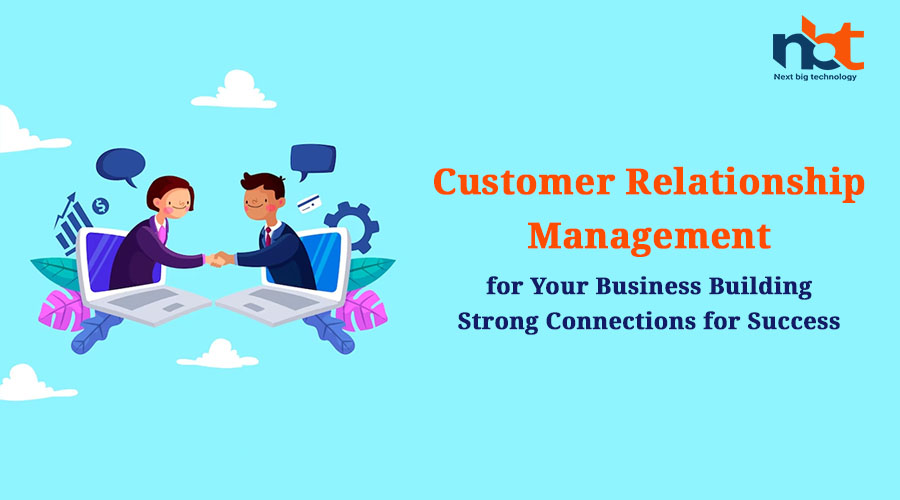Introduction: In today’s competitive business landscape, customer relationship management (CRM) has become a vital strategy for organizations looking to build lasting relationships with their customers. A robust CRM system enables businesses to effectively manage customer interactions, improve customer satisfaction, and drive growth. In this blog, we will explore the importance of CRM and provide a comprehensive guide on implementing CRM for your business.
- Understanding Customer Relationship Management (CRM): CRM refers to the strategies, processes, and technologies businesses use to manage and nurture their relationships with customers. It involves capturing, analyzing, and leveraging customer data to better understand their needs, preferences, and behaviors. By implementing CRM, businesses can enhance customer experiences, foster loyalty, and drive profitability.
- The Benefits of CRM: Implementing CRM can bring numerous benefits to your business, including:
- Enhanced Customer Insights: CRM provides a centralized platform to gather and analyze customer data, enabling businesses to gain valuable insights into customer behaviors, preferences, and trends.
- Improved Customer Engagement: With CRM, businesses can personalize interactions and deliver tailored experiences based on individual customer profiles, leading to higher engagement and customer satisfaction.
- Streamlined Sales and Marketing Processes: CRM systems help automate and streamline sales and marketing activities, allowing teams to manage leads, track customer interactions, and optimize campaigns for better results.
- Increased Efficiency and Productivity: CRM eliminates manual tasks, enhances collaboration, and provides a centralized database, saving time and boosting productivity across departments.
- Better Customer Service: CRM enables businesses to respond to customer inquiries and issues promptly, track service requests, and provide a consistent and personalized customer service experience.
- Data-Driven Decision Making: CRM analytics and reporting capabilities provide actionable insights, enabling businesses to make data-driven decisions and identify areas for improvement.
- Choosing the Right CRM Solution: Selecting the right CRM solution is crucial for the success of your implementation. Consider the following factors:
- Business Requirements: Identify your specific CRM needs based on your industry, customer base, and organizational goals.
- Scalability: Ensure the CRM solution can scale as your business grows and adapts to changing customer demands.
- Integration Capabilities: Assess the CRM system’s ability to integrate with your existing tools and systems, such as marketing automation software, email platforms, or customer support systems.
- User-Friendliness: Evaluate the user interface and usability of the CRM system to ensure ease of adoption by your team.
- Security and Data Protection: Prioritize a CRM solution that offers robust security measures to protect sensitive customer data and complies with data privacy regulations.
- Implementing CRM: Successful CRM implementation involves the following steps:
- Set Clear Goals: Define your objectives and desired outcomes for implementing CRM. Align these goals with your business strategy to ensure a focused and effective implementation.
- Data Migration and Cleansing: Transfer existing customer data into the CRM system, ensuring data accuracy and consistency. Cleanse and validate data to eliminate duplicates and errors.
- User Training and Adoption: Provide comprehensive training to employees to ensure they understand the CRM system’s features and benefits. Encourage user adoption and address any concerns or resistance through effective change management.
- Customization and Configuration: Tailor the CRM system to meet your business requirements. Configure workflows, automate processes, and customize fields and layouts to align with your specific needs.
- Integration with Existing Systems: Integrate the CRM system with your existing tools and systems to ensure seamless data flow and a unified view of customer interactions across departments.
- Continuous Improvement: Regularly review and refine your CRM implementation. Collect feedback from users, monitor key performance indicators, and make adjustments to optimize CRM usage and drive continuous improvement.
- Customer Data Management: Effective CRM relies on accurate and up-to-date customer data. Implement data management practices such as:
- Data Capture: Collect customer data through various touchpoints, including website forms, social media interactions, customer surveys, and purchase history.
- Data Segmentation: Categorize customer data into segments based on demographics, behavior, purchase history, or other relevant criteria. This segmentation allows for targeted marketing and personalized experiences.
- Data Privacy and Security: Ensure compliance with data protection regulations and implement security measures to protect customer data from unauthorized access or breaches.
- Regular Data Cleansing: Periodically review and clean your customer data to remove duplicates, outdated information, and inaccuracies. This ensures the integrity and reliability of your CRM database.
- Leveraging CRM for Business Growth: Once your CRM system is up and running, leverage its capabilities to drive business growth:
- Customer Engagement and Retention: Use CRM insights to develop targeted marketing campaigns, personalized offers, and loyalty programs that foster engagement and loyalty.
- Sales Performance Optimization: Utilize CRM analytics to identify sales trends, evaluate pipeline health, and provide sales teams with actionable data to improve conversion rates and win rates.
- Customer Service Excellence: Leverage CRM to track and manage customer service interactions, prioritize service requests, and provide timely and personalized support.
- Continuous Improvement: Regularly review CRM analytics and reporting to identify areas for improvement, refine processes, and enhance customer experiences.
Conclusion: CRM plays a crucial role in building strong customer relationships and driving business growth. By implementing an effective CRM strategy, businesses can gain valuable insights into customer behavior, improve engagement, streamline processes, and deliver exceptional customer experiences. Invest in the right CRM solution, ensure data accuracy and security, and leverage CRM insights to make informed decisions and nurture long-term customer loyalty. Implementing CRM is a journey that requires commitment, continuous improvement, and a customer-centric mindset to truly reap the benefits it offers.

















